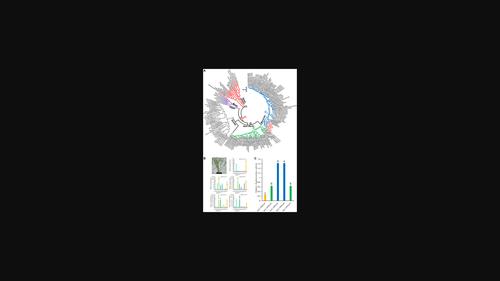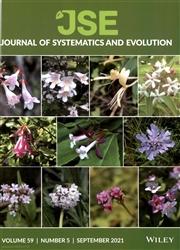点状红豆杉 rbcS 多基因家族的分子进化
IF 2.9
1区 生物学
Q1 Agricultural and Biological Sciences
引用次数: 0
摘要
Rubisco 由大亚基(由叶绿体基因 rbcL 编码)和小亚基(由核 rbcS 多基因家族编码)组装而成,参与光合作用卡尔文循环中的二氧化碳固定过程。尽管已经对许多植物的 Rubisco 进行了研究,但不同 rbcS 基因之间的进化分化在很大程度上仍是未知的。在此,我们利用与水稻密切相关的野生物种 Oryza punctata Kotschy ex Steud,研究了该物种中 rbcS 基因的不同特性。我们发现了五个 rbcS 基因(OprbcS1 至 OprbcS5),其中 OprbcS1 与其余四个基因在染色体位置、基因结构和序列同源性方面都呈现出不同的进化模式。系统进化分析表明,植物 rbcS1 和其他非 rbcS1 基因起源于一个共同的古老复制事件,该事件至少发生在种子植物的祖先中。随后,RbcS1 在包括水稻在内的少数植物品系中得以保留,而非 rbcS1 则主要在被子植物中扩增。OprbcS1、OprbcS2-OprbcS4和OprbcS5分别在茎和种子、幼叶和成熟叶片中显著表达。酵母双杂交试验发现,与其他四对蛋白(OprbcS2-OprbcS5 和 OprbcL)相比,OprbcS1 和 OprbcL 之间的相互作用显著减少。我们认为,OprbcS1 可能被赋予了不同的功能,主要特异于非光合器官,而 OprbcS2-OprbcS5 在 Rubisco 组装过程中具有不同的亲和力,可能在光合器官中被亚功能化。这项研究不仅加深了我们对 Rubisco 精细组装过程的了解,也为今后野生稻的驯化提供了一些启示。本文章由计算机程序翻译,如有差异,请以英文原文为准。

Molecular evolution of the rbcS multiple gene family in Oryza punctata
Rubisco is assembled from large subunits (encoded by chloroplast gene rbcL) and small subunits (encoded by the nuclear rbcS multigene family), which are involved in the processes of carbon dioxide fixation in the Calvin cycle of photosynthesis. Although Rubisco has been studied in many plants, the evolutionary divergences among the different rbcS genes are still largely unknown. Here, using a rice closely related wild species, Oryza punctata Kotschy ex Steud, we investigated the differential properties of the rbcS genes in the species. We identified five rbcS genes (OprbcS1 through OprbcS5), OprbcS1 showed a different evolutionary pattern from the remaining four genes in terms of chromosome location, gene structure, and sequence homology. Phylogenetic analysis revealed that plant rbcS1 and other non‐rbcS1 genes originated from a common ancient duplication event that occurred at least in seed plants ancestor. RbcS1 was then retained in a few plant lineages, including Oryza, whereas non‐rbcS1 was mainly amplified in angiosperms. OprbcS1, OprbcS2–OprbcS4, and OprbcS5 were prominently expressed in stems and seeds, young leaves, and mature leaves, respectively. The yeast two‐hybrid assay detected a significant decrease in the interaction between OprbcS1 and OprbcL compared to the other four pairs of proteins (OprbcS2–OprbcS5 and OprbcL). We propose that OprbcS1 might be assigned a divergent function that was predominantly specific to nonphotosynthetic organs, whereas OprbcS2–OprbcS5, having different affinity in the assembly process of Rubisco, might be subfunctionalized in photosynthetic organs. This study not only deepens our understanding of the fine assembly of Rubisco, but also sheds some light on future de novo domestication of wild rice.
求助全文
通过发布文献求助,成功后即可免费获取论文全文。
去求助
来源期刊

Journal of Systematics and Evolution
Agricultural and Biological Sciences-Ecology, Evolution, Behavior and Systematics
CiteScore
7.40
自引率
8.10%
发文量
1368
审稿时长
6-12 weeks
期刊介绍:
Journal of Systematics and Evolution (JSE, since 2008; formerly Acta Phytotaxonomica Sinica) is a plant-based international journal newly dedicated to the description and understanding of the biological diversity. It covers: description of new taxa, monographic revision, phylogenetics, molecular evolution and genome evolution, evolutionary developmental biology, evolutionary ecology, population biology, conservation biology, biogeography, paleobiology, evolutionary theories, and related subjects.
 求助内容:
求助内容: 应助结果提醒方式:
应助结果提醒方式:


